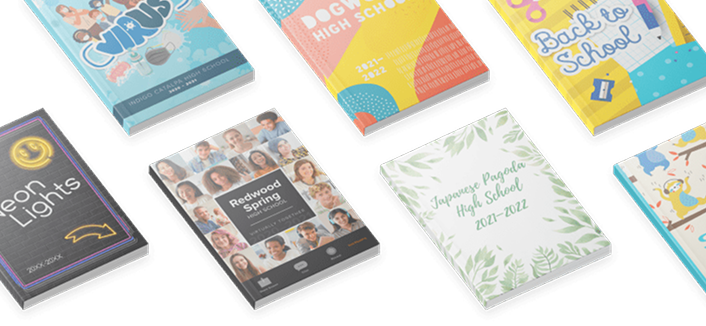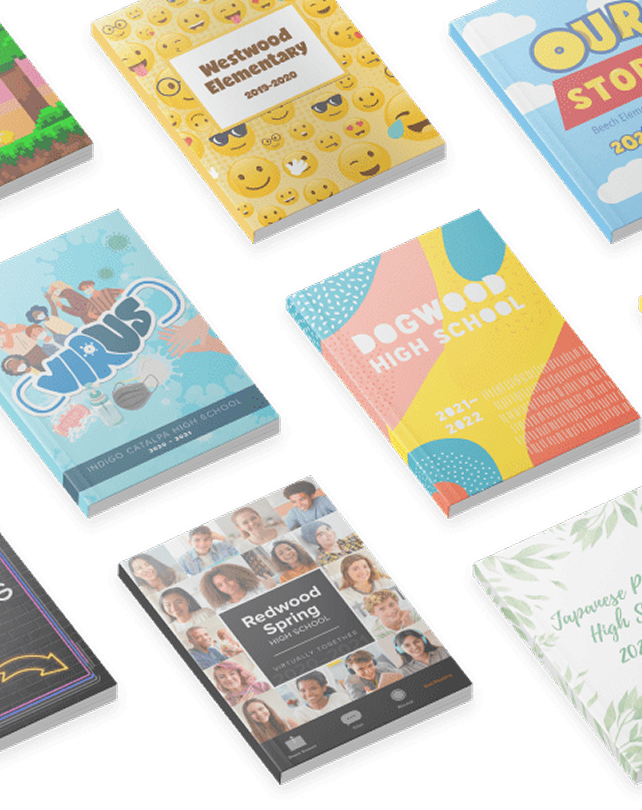Most popular
Subscribe to our blog
Most recent

Treering + sandy hook promise
This year marks one of changes for Treering. To go with our new look, we have a new philanthropic partnership. Treering Yearbooks is taking another step towards promoting inclusion through partnering with Sandy Hook Promise. By choosing Treering to print your school's yearbook, you not only have access to crowdsourcing options and custom pages, but your purchase is also contributing to the “Know the Signs” prevention programs and K-12 instruction on empathy and inclusion.
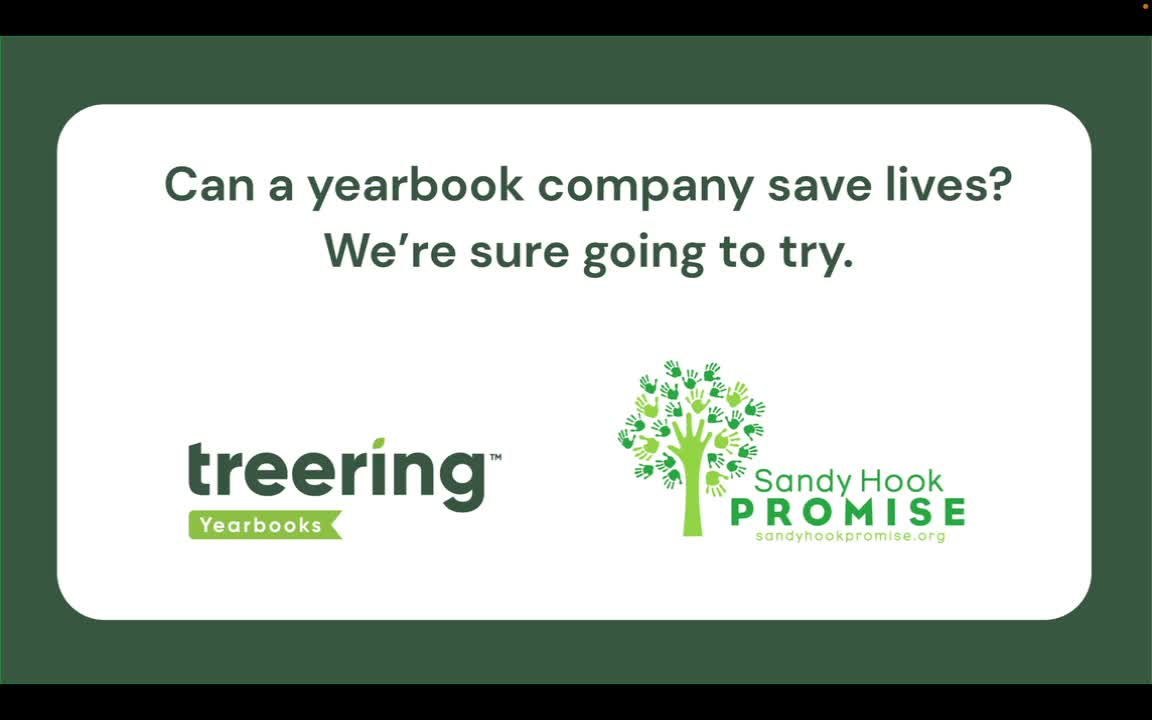
Treering Yearbook's custom pages changed the way students tell their own stories: by providing an opportunity for families to upload photos and create their own pages in their student's book, we accurately showcase each student's interests and contributions. Then, crowdsourcing options widened the narrative to include more angles and perspectives from the year.
The "Know the Signs" programs include:
- Start With Hello: For students in grades K-12, Start With Hello teaches youth how to minimize social isolation, marginalization, and rejection by creating an inclusive community that reaches out and connects with at-risk individuals.
- Say Something: For students in grades K-12, Say Something teaches youth to recognize warning signs, especially in social media, from individuals who may be a threat to themselves or others and Say Something to a trusted adult or report it using our Anonymous Reporting System.
- Say Something Anonymous Reporting System (SS-ARS): For students in grades 6-12, SS-ARS enables youth to easily submit safe, anonymous safety concerns through a mobile app, website, or hotline number. SHP’s highly-trained, multilingual Crisis Counselors respond to tips 24/7/365, engaging youth in dialogue to assess and substantiate the tip, provide immediate crisis/suicide intervention, and triage the tip to local school and/or law enforcement response teams as needed.
- Students Against Violence Everywhere (SAVE) Promise Clubs: These student-led clubs empower students in grades K-12 to champion violence prevention in their schools and communities.
Join us to create inclusive yearbooks while teaching compassion and looking out for one another–together, let’s create a culture change!
Can a yearbook company save lives? We're sure going to try!
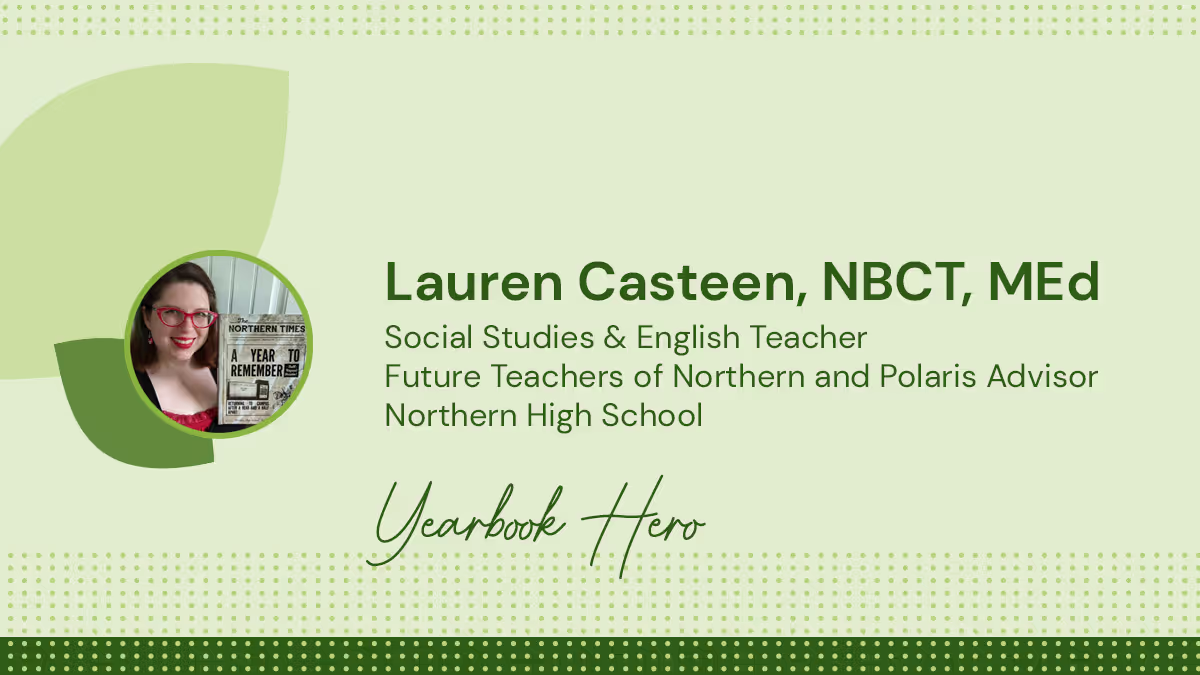
Yearbook hero Lauren Casteen focuses on equity
Treering Yearbook Heroes is a monthly feature focusing on yearbook tips and tricks.
Yearbook Hero Lauren Casteen decided in kindergarten if she were a teacher, she could go to school every day. Her passion for diversity, equity, and inclusion transformed her approach to teaching yearbook class: instead of recruiting the top 20 students to create a book about their friends, she built a team that reflects the students whose stories they tell. In 2022, Lauren earned an M.Ed. in Urban Education with a certificate in Anti-Racism. Her pedagogical approach is to lead the yearbook class as a public history course where the goal is to accurately and thoughtfully record the history of Northern High School.
Why should someone buy a yearbook in 2022?
As a historian, I like knowing that there is an artifact. Our yearbook students are telling future generations, “We were here!” It is something future scholars will study. Furthermore, our yearbook students have written and published something. It matters.
So much of our memory-keeping has become digital. I have 500 pictures on my Instagram, but it doesn’t compare to having something to physically go through. Digital doesn’t create a reverence for your memories.
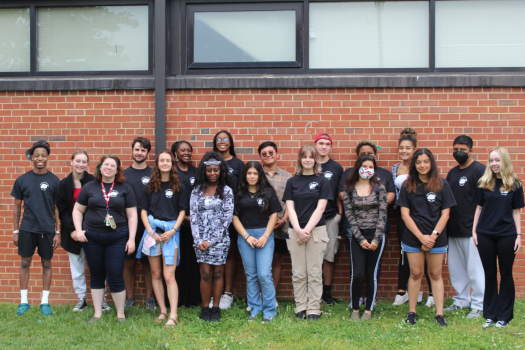
How do you address issues of equity with the yearbook?
When I inherited the yearbook program, it required a written application with teacher references. It limited the type of students who could apply. Now, any student can sign up regardless of grade or ability level. I run a discipline report prior to scheduling anyone in my class and have one-off conversations with students [e.g. history of truancy] as needed.
With yearbook, there are many places where different kinds of students can be successful, and I want a committed staff that is representative of the student body. We are a majority non-white, Title 1, semi-urban school. Students of all educational abilities and language backgrounds roam the halls. The yearbook class should reflect that.
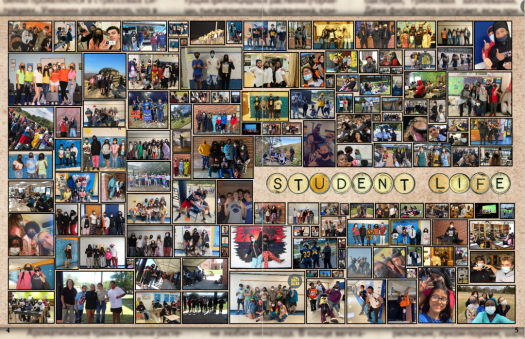
And you sold out three times.
Yes! I had to do a second order and had to open up sales to with the ship-to-home option.
What made the Knights want the yearbook?
The yearbook staff evaluated last year’s yearbook: we found out it covered mainly the juniors and seniors. It was also very white, when the school is very diverse. We resolved to make it look like our school.
As a school that is committed to equity, we can’t do that if we don’t know who is in the book. Since the yearbook is a historical document in the most faithful way possible, our team tagged and tracked coverage. And since my staff cannot be everywhere all the time, it is important for other people to send us things.
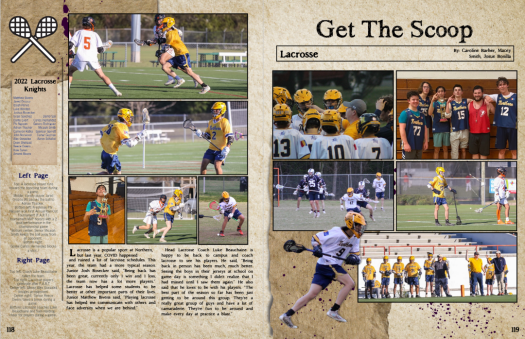
How did you crowdsource content?
I started with the teachers. I recorded a tutorial and emailed it, asking them to send us photos for the yearbook. The chorus and outdoor ed faculty were early adopters. I even taught the lacrosse team how to share photos via the app when they were headed to Wilmington for a game.
On our yearbook Instagram, we post sneak peeks. Someone commented that the outdoor ed page looked good. We responded, giving credit to the teacher. This created a buzz and now some teachers have a student classroom photographer to put ownership and responsibility on the kids. It also makes them want to join the yearbook staff.
Students like that the app talks to their Instagram; teachers like that it connects to their Drive.
What does the fall look like for the team at Northern?
I have 70 students signed up for the yearbook class for the 2022-23 school year. We are excited about this year’s book, as it will be the last book we’ll produce in our current building—we’re moving to a new home next year!

5 social media posts to sell yearbooks
Getting social to sell yearbooks sounds easy: just post and parents will pay up, right? We get it, yearbook sales can be stressful, especially if you have a publisher who requires an order quota. Adding social media to your yearbook marketing strategy can only help increase the visibility of your staff and your product. Here are five types of Instagram and Facebook posts to add to your yearbook's social cadence. (Share if you love your yearbook… kidding.)
1. Positive Peer Pressure
Customer loyalty is a big deal–it’s why we collect stars and points and become an Insider. You can erase the thought of a back-end engineering feat to get students a digital punch card in their Remind account and head to the local dollar store for a bag of candy. (We like candy necklaces because they are wearable reminders, thus reinforcing our campaign.)
A simple, reward offering of “Sweet! You bought a yearbook!” followed by the names of buyers will create a positive buzz around campus.
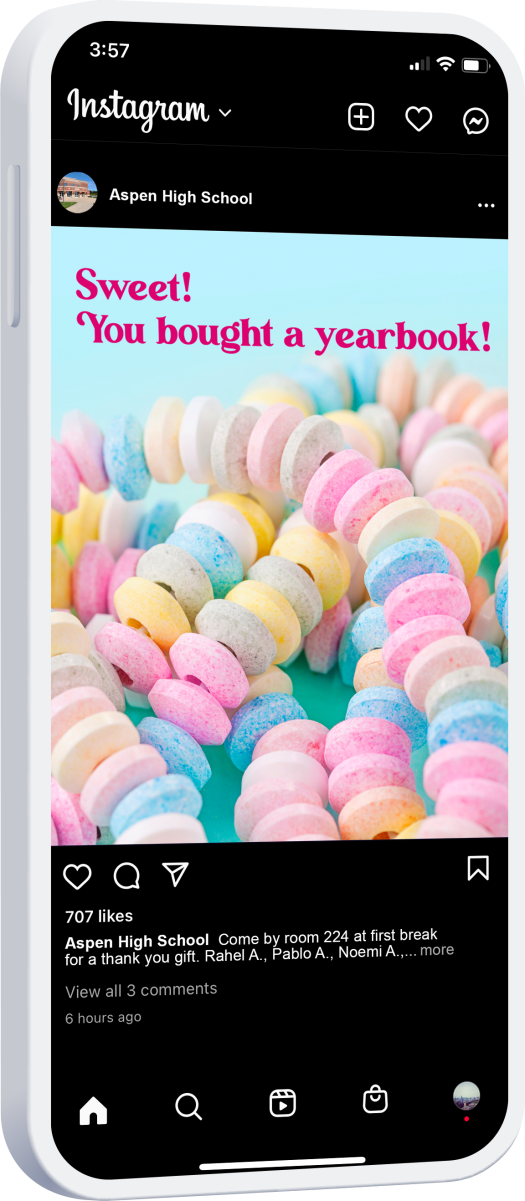
How it Helps Sales
We’ve talked about social proof. We’ve talked about FOMO. This yearbook social media post does that and
- Shows appreciation to those who listened early on and bought a yearbook.
- Answers the age-old question: “Did I buy a yearbook?”


2. Call to Action: Crowdsourcing
Specific asks give you specific results. Consider these the two above: which one brought in 35 submissions in 24 hours?
How Pictures Yield Purchases
This is not new information: if students know they are in the book, they will want the book. Using student-sourced photos from social media help sell yearbooks because it tells more of the year. And that’s our job. Follow up these calls to action by showing students you used their photos.
3. Sneak Peeks
Sneak peeks include: cover shots, close-ups or excerpts of spreads, and releasing yearbook photos. Be sure to include a countdown to distribution.
A few weeks before your final deadline, order your printed proof. Besides seeing the top-notch quality, you can use your book in photos to promote last-minute sales.
Use the Yearbook to Sell Itself
Product teasers are a mainstay in the marketing world. They pump up potential yearbook buyers and answer “What’s in it for me?”
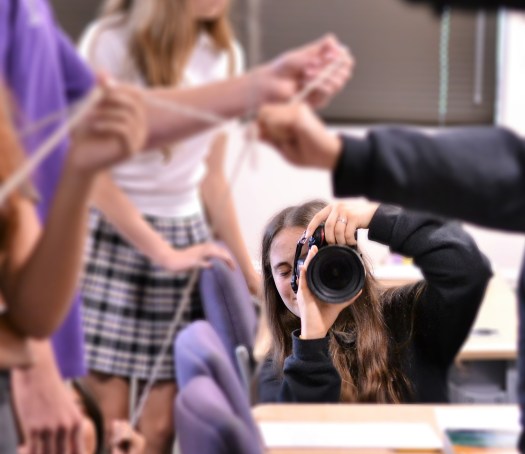
4. Show and Tell
Giving glimpses of the work behind the scenes connects customers to the product. It builds trust among the student body because they see your team them working hard to photograph track meets in 100-degree heat or giving up their time at Homecoming to take photos on the dance floor. Beyond work, teambuilding, editor lunches, and TikTok trends can also serve as recruiting tools for next year’s staff.
Sell by Showcasing Your Yearbook Culture on Social Media
The yearbook shouldn’t be about your yearbook staff, but because of them. Parents, students, and teachers will believe in the work you are doing if they see themselves in it.
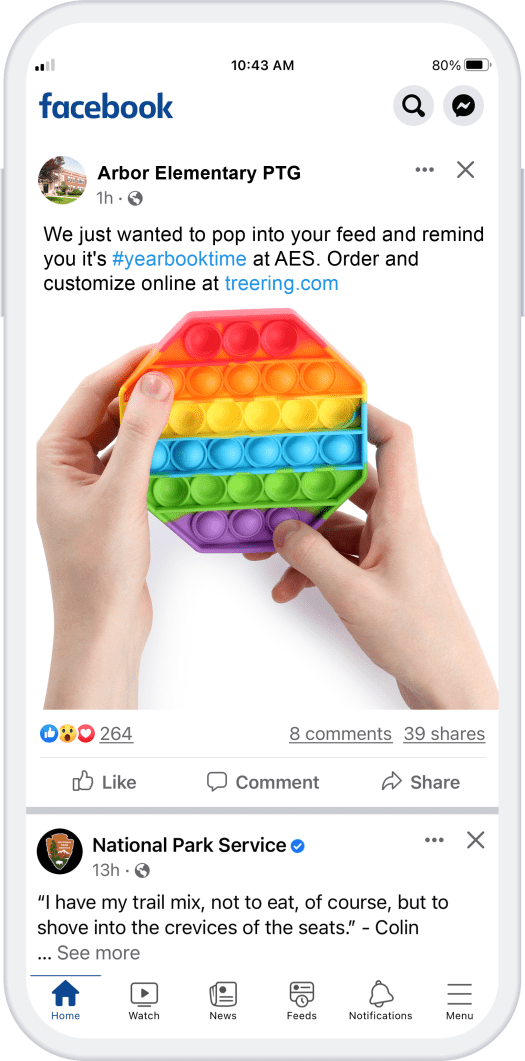
5. Nitty Gritty
The most important thing you can do it tell people how, when, and where to buy. Give them the details and make it easy. While a general “Buy a Yearbook” post shouldn’t be the only yearbook marketing post in your social toolkit, friendly reminders do help. You will sell more yearbooks by varying posts and increasing engagement on your social media channels.
Why We (Still) Share Yearbook Info
For the same reason your five year old knows the phone number for an all-inclusive resort, mere exposure leads to sales. People tend to love familiarity, and that’s why yearbooks are a tradition.
We’re just going to leave this here.
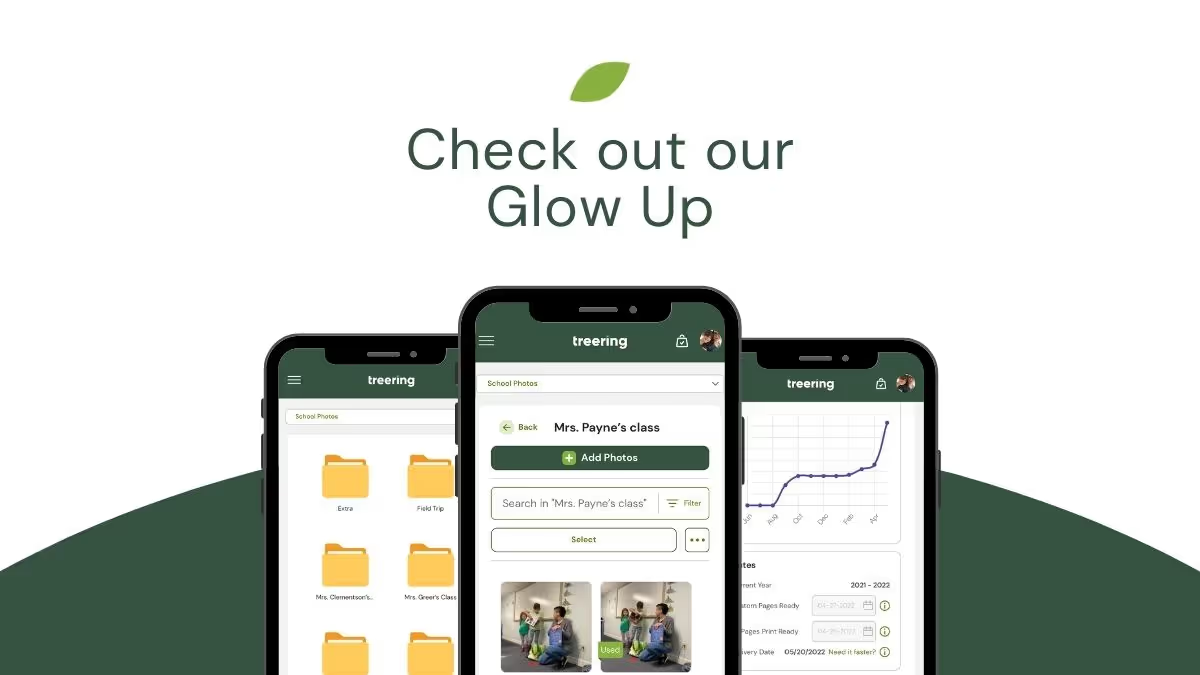
Treering’s glow up
Things are changing at Treering: you may have noticed the new look of the help center, blog, and website. This visual polish includes sleeker graphics, universal icons, and a more tranquil and optimistic green. Really: it’s the digital equivalent of getting our braces removed.
What hasn’t changed is who we are: your partners for a flexible, stress-free yearbook publishing experience. You are still in control of deadlines, page count, book content, yearbook quantities, editing permissions, and how your yearbooks are sorted in your shipment.
Not Just Cosmetic
Yearbook editors, advisers, and coordinators told us they wanted
- To enter the spread designer with fewer clicks
- More space to edit
- Time to prepare yearbook details before selling the book
- A way to donate books
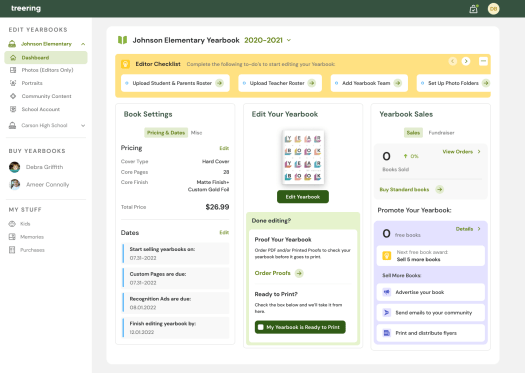
Menus
Instead of a deep navigation (think: click, a new page, click, a new page, click, do your thing, save), we’ve kept chief editor controls centralized on the Dashboard. And while you're in the editor, you can now focus 100% on layout and design.
While adding photos to a template, do you have an idea for an additional spread? With the paginal navigation up top, you can preview thumbnails of your book and navigate throughout. Using the top navigation, you can also make changes to styles, move pages, and access help articles.
Yearbook Editor
The good news is all your favorites— templates, auto layout, and alignment tools—still exist.
The better news: since the left and right menus have merged, you have more space to edit. The zoom tool is faster and smoother making precision edits easier.
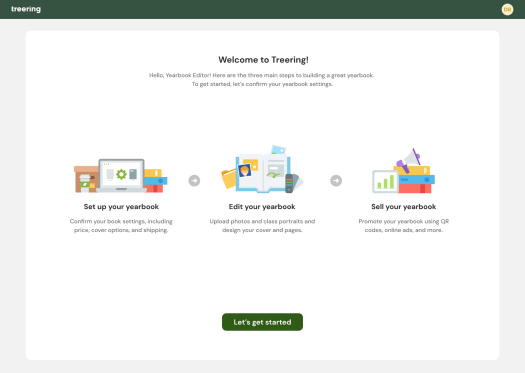
More Time, More Control
Now you can begin selling yearbooks on your school's schedule by setting the date of the sale. We had many editors ask for more time to determine their ladder, page count, and fundraiser. When you’re ready, or on our universal go-live date of October 15, 2022, you can launch the online sales platform.
We recommend taking advantage of the early yearbook sales incentives and discounts.
Book Donation
This option launched in the spring for a trial and the positive feedback made it a keeper. When editors enable this option, parents can purchase an additional book to donate to the school. Some advisers gift them to teachers, and others distribute them to students in need.
We know change can be scary. When Treering entered the yearbook space toting a print-on-demand, no contract yearbook solution, schools were wary of this too-good-to-be-true proposition. We're glad you're on this journey with us.
.png)
Yearbook hero Janet Yieh gives away yearbooks
Treering Yearbook Heroes is a monthly feature focusing on yearbook tips and tricks.
Long-time Treering editor Janet Yieh from San Francisco, CA started gifting yearbooks when her high schooler son was in elementary school. She added a fundraiser to the cost of the yearbook so every promoting fifth-grader received a free yearbook. Now, as the Family Partnerships Coordinator at Presidio Middle School in San Francisco, CA, she ensures every eighth-grader who wants a yearbook leaves with one.
This year you gave away over 100 books. How is that possible?
In August and September, I push for early sales so parents can get the best price and I can earn free books from Treering. On September 30, I use the fundraiser to buy as many books as possible with the 10% discount. Then, in October, I do the same thing.

Almost two-thirds of the graduating class purchases a full-price yearbook and I try to give away as many as possible by creating a contest. It susses out students who might not be able to afford a book and don’t want to ask for a free one.
How do you advertise?
I’m consistent with marketing: during the daily bulletin in homeroom, teachers show the tiny URL to register for the contest. In parent newsletters, there is an ad saying, “Hey, your kid could win a free book!” When parents hear about the book contest, some still purchase the book.
I also strategically reach out to teachers to see if they know any students who want to win a free book. It’s actually hard to get students to fill out the form.
What other tips do you have?
The students in the yearbook club received their books a day early. This created excitement and I sold out of the extra yearbooks I had on hand.

How many pages do I need in the yearbook?
You’re planning for the school year: you chose a publishing partner, the yearbook team and curriculum are set, and the clock is ticking to the first day of school, better known as the first day of coverage. Are you feeling overwhelmed yet? (We hope not!) Determining your yearbook's page count is a quick win and a way to get the year(book) organized. Your school’s enrollment and your yearbook ladder are two ways most schools get set up. We’ll discuss the merits of both.
Use Your Enrollment to Determine Page Count
Math lesson: there are 380 students on campus and you want to ensure three-times coverage. With an average of 12 photos on each spread (that’s two facing pages for those of you playing along at home), you’ll need about one spread for every 16-24 students. That breaks down to:
- 50 students or less: 32 pages
- 50-300 students: 40 pages
- 300-500 students: 64 pages
- 800-1000 students: 80 pages
- 1000+ students: 100-400 pages
While it’s nice to have a range, that’s a fairly impersonal method of guestimating your page count. It neglects the nuances, personality, and culture of your school. Let’s look at a second option for determining how many pages you need.
Why a Yearbook Ladder Is Win-Win-Win
A yearbook ladder is a chart that represents the pages in a yearbook. To build it, grab the last few years’ yearbooks, the latest school calendar, and your team.
- Brainstorm the non-negotiable events, sections (people, arts, sports), and yearbook traditions
- Brainstorm features, specials, and theme-related content
- Decide if you will organize the book chronologically, topically, or a blend of both
- Allocate spreads
We love doing this digitally because it can be fluid. If your page count is looking overwhelming because of time or budget, combine some topics. If it is underwhelming, return to number two: what additional, meaningful content will you add to your yearbook?
Remember, if you’re working with Treering, your page count is flexible; increase or decrease it at any time.
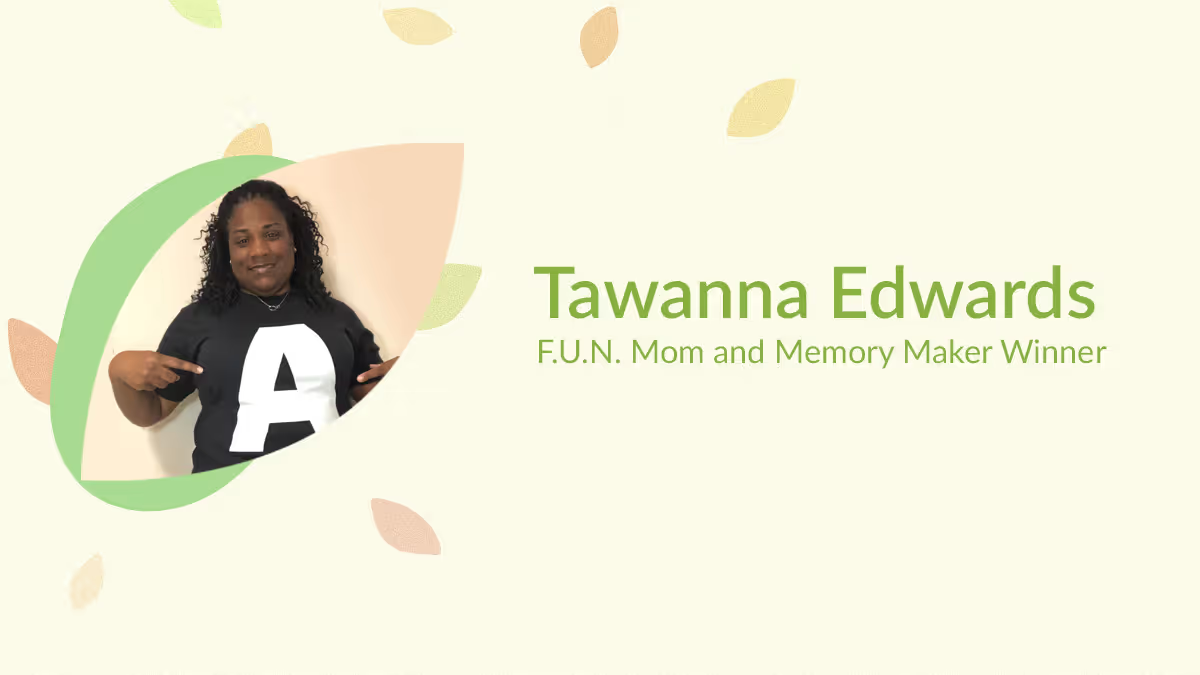
Yearbook hero Tawanna Edwards brought her a-game
Treering Yearbook Heroes is a monthly feature focusing on yearbook tips and tricks.
In our first-ever parent contest, Treering Yearbooks asked parents to capture and share their child’s unique POV. Elementary winner Tawanna Edwards from Cantonment, FL loves to play on words and used the first letter of her daughter Amani’s name to guide her design efforts.
We love how you organized your custom pages around your “A Moments.”
You’ve got to always bring your A-game! This year has been a year of many firsts and I created our custom pages to celebrate our activities, accomplishments, and accolades!
Talk us through each spread.
Activities: We have SO much fun participating in activities, whether it is schoolwide, or classroom-driven, Ammani wants to be a part of it all. A highlight has been the Bottle Biography Report on Katherine Johnson, a NASA mathematician who loved to count and helped change the world with numbers that soared astronauts to the moon and home safely. Ammani is great with her hands, and it has been amazing to see her little mind at work to create a masterpiece.
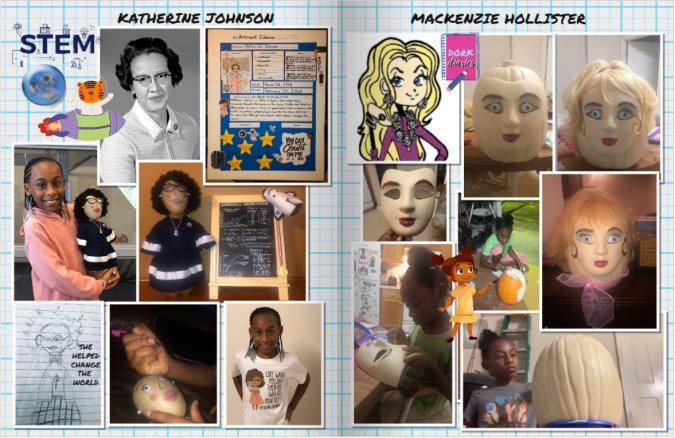
Accomplishments: We love our school and have cub pride in everything that we do! From spirit wear to fundraisers, we support every cause and do our part.
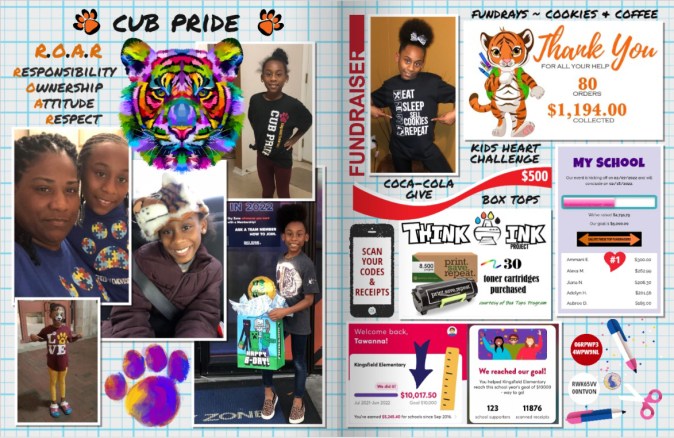
Accolades: Ammani has been on Cloud 9 with all her accomplishments, especially the yearbook cover contest, so we are embracing this accolade and sharing this moment with every student on the front cover of every yearbook this year.
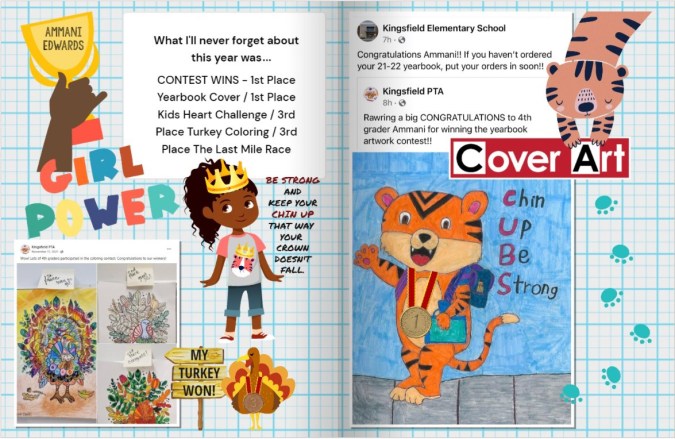
Clearly, you had a plan for your custom pages–how do you begin to organize an amazing year like Amani’s?
Action speaks louder than words! Every picture chosen was "A Moment" that focused on what this year truly meant to us. Those actions captured the essence of success from many different angles.
I choose pictures of activities that Ammani is amped to be a part of and those that have us attached at the hip. Life is too short, so I try not to miss opportunities to show my support, whether it is Polka Dot Day coloring circles on her face or Running Club Relay with a 5K race and coming in LAST place.
What’s your favorite part about the process?
I am the Author! Being a quality engineer by day and a Treering page designer by night, I can create and give existence to anything my heart desires. The amazing part: I have access to graphics that look like me! Treering took the time to add that special touch to make me feel important, like I was part of the process.
What advice would you give to another mom who is just getting started?
Activate your creativity! Take the time to explore all options available to you before you customize: from backgrounds to layouts to text fonts to graphics.
Have F.U.N. (Fully Understand Newness). When I started this journey, I had no idea there was so much to choose from that I did not take the time to truly learn the process. It can be a bit overwhelming, but each year I learn something new that can be used to make my custom pages stand out better than the year before.
There is no right or wrong way to customize your pages… create your own F.U.N. (Find Ur Niche) and have fun at it!

Yearbook signing tips
On the way home in the carpool, yearbook mom Kristie overheard her daughter and three friends talking about their yearbooks staying overnight at school so their teacher could look them over and cover up things like “stinky skunk” and “Chungus.” There were hurt feelings and students who felt uncomfortable through the yearbook signing process.
Kristie said, "The kids are constantly being talked to about kindness and all that jazz, and I think much of what happened today was one kid thinking they’re hilarious and the other thinking they smell like a skunk."
Bottom line: we haven't taught our kids how to sign a yearbook.
[Old lady voice] When I was in high school, I had already combed my parents' yearbooks and learned their deep secrets. I knew the art of reserving a page in my BFF's yearbook so I could fill it with Spice Girls' lyrics, inside jokes, and the obligatory, "Thanks for always being there for me." I wasn't commenting on her posts daily and DM'ing her. Her yearbook was the one-stop shop to confess my deep admiration and devotion.
For those who weren't in my circle in the quad, a shorter message strategically squeezed between longer passages made it look as though I ran out of room. (The winning formula is below.)
How Do You Sign a Yearbook for Someone You Don't Really Know?
- Spell names correctly
- Choose something specific to call out
- Say thank you for being you: Gen, I love your smile. Thanks for sharing it with the world.
- Sign your first and last name
How Do You Sign a Yearbook for Someone Who's Not Your BFF?
- Spell names correctly
- Find something positive to say
- Say thank you for being you: Paulo, You are confident in your abilities. Thanks for sharing your interest in horses with us.
- Sign your first and last name
Yearbook Signing for the Besties
Add Yearbook Lingo
Some things never change; we bet every 90s mom has two or three of these acronyms in her yearbook.
- BF Boyfriend
- BFF Best friend forever
- GF Girlfriend
- HAGS Have a Great Summer
- KIT Keep in Touch
- LYLAS Love you like a sister
- TTFN Ta-ta for now
Add Variety
Creative yearbook signing ideas, such as adding in song lyrics or writing messages in a more artistic form, break up the passages from others.
Remember, your signature will last as long as that book. Make it count.

Treering fundraising: from yearbook loss to profit
Wouldn't it be great if your yearbook could help buy your school new Chromebooks or iPads or fund a new STEAM program? We think so too! Treering has already helped schools raise more than $11 million (and counting) and funded all kinds of wonderful things for schools. Make money from something you already do: add any amount to the price of your yearbook as a fundraiser.
Our books are so fairly priced that you don't need to feel guilty about adding a fundraiser to the cost of the book. Let's say the core price of your book is $45, and you add a $5 fundraiser. If you sell 500 books, you will have raised $2,375 for your school! That could cover the cost of a few educational field trips!
Full disclosure (because, hi, we love transparency): Treering charges just 5% processing to cover the credit card and bank fees.
Fundraising in Action
Mercury Mine Elementary
"Treeing's fundraising tools helped my school build a yearbook program that no longer creates a drain on our finances. Now with Treering we MAKE money on our yearbook program. Funds raised from the yearbook go to our school's 501c3 Parent Teacher Group and help us to support the school’s programs and services. Our PTG strives to promote communication, understanding, and cooperation among students, parents, faculty, and the Miner community. Our goal is to promote a supportive and engaging community atmosphere and Treering helps us reach those goals." - Erin
Augusta Circle Elementary
"We use Treering’s fundraising tool in two ways. First, we add to the cost of the book, making $1 off each book sold. We also sell celebration ads to parents. We use our extra funds to provide yearbooks to 5th graders who may otherwise not be able to buy one, so that all graduating students leave with a yearbook. Last year, we raised enough money to refinish the outside basketball courts, which were worn down, cracked, and had become hazardous, plus added two new basketball goals! This year we hope to add a large sunshade over part of the playground with the money we raise through the yearbook. We are so grateful for Treering!" - Ansley
Presidio Middle School
"We give books to 8th graders who are moving up to high school. I give away about 60 books to 8th graders. We call it a contest, [students have to fill out an online form to enter] but it susses out students who might not be able to afford a book and don’t want to ask for a free one." - Janet
PSA on Fundraising With Yearbook Ad Sales
Typically, yearbook ad sales are one way teams do their fundraising.
Generally speaking, schools sell yearbook ads for one of three reasons:
- To pay back existing publisher debt
- As an opportunity to teach business skills (sales, advertising, negotiation, and more)
- As a fundraising effort to purchase new equipment
Number one can happen for myriad reasons: perhaps you bought far too many books last year, maybe your budget was slashed, or you inherited a yearbook program in the red. Negotiate, negotiate, negotiate with your publisher for more school-friendly terms. (Thank you for coming to our TED Talk.)

While selling ads is a good way to teach students about business, it’s not a necessity for every yearbook program. Virtually any fundraising opportunity can be turned into something teachable, and selling ads is probably the most resource-intensive of the bunch. This reality is what makes ad sales particularly alluring because they quite literally become part of the finished product.
If you want to add business development consider teaching:
- Problem-solving
- Goal-setting and project management
- Team leadership
- Social media marketing to promote your program, book sales, and crowdsourcing
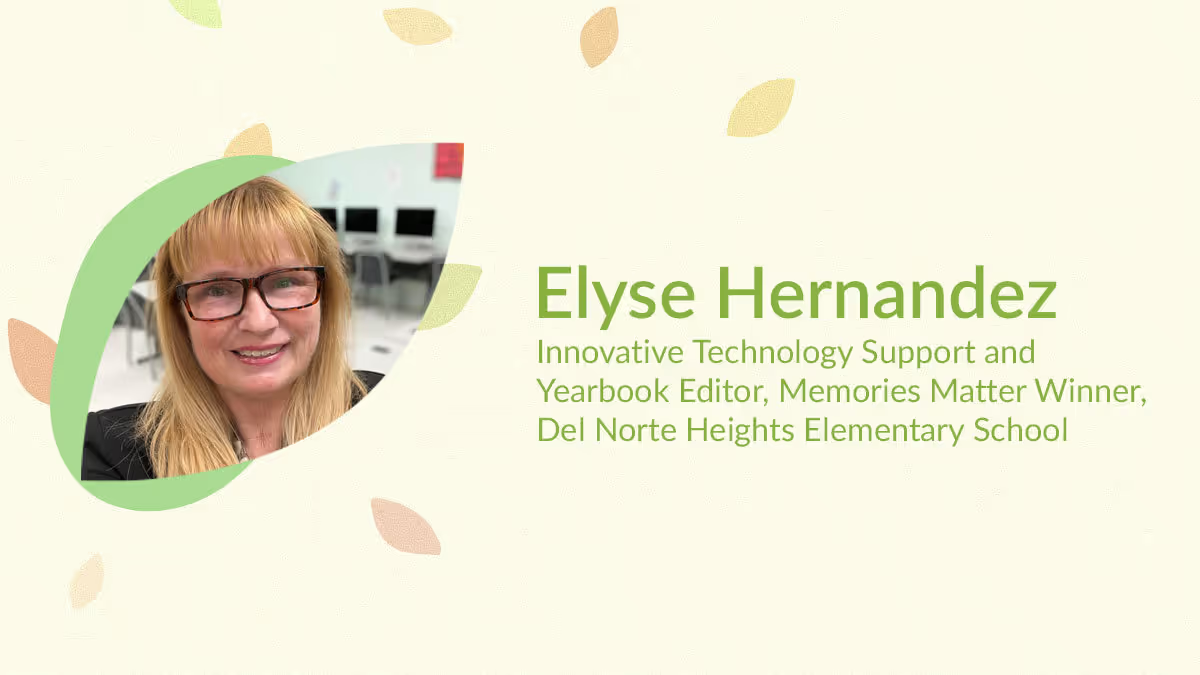
Yearbook hero Elyse Hernandez: she did it again
Treering Yearbook Heroes is a monthly feature focusing on yearbook tips and tricks.
In March, Treering Yearbooks announced its 2022 #TreeringMemoriesMatter Design Contest for yearbook advisers, coordinators, and editors to share their unique perspectives from their campus community. It’s time to meet the winners and glean their best practices for yearbook spread design.
Last year, Elyse Martinez from Del Norte Heights Elementary School in El Paso, TX submitted a face mask fashion spread for the inaugural #TreeringMemoriesMatter Design Contest. The spread won second place. Fast forward a year, and her design earned the top prize among the elementary schools.
Congratulations, Elyse!
I believe that two years of national recognition tells the community that our yearbook is timely and a great representation of current events. It lets the community know that much love and intent goes into the creation of a book that they can cherish as they look back on the memories of their child.
I am very competitive and I'm also very proud of the work I put into the yearbook. I also love to win stuff! The option to win additional free yearbooks allows us to provide books as an incentive and a reward for students who otherwise might not have the opportunity to purchase the yearbook.
Tell me how your school community responded.
We are excited and proud! As I began sharing with students, they cheered—especially the class that was key in planning the Sept. 11 tribute. They were the ones who read special excerpts to commemorate the event. One wrote a poem she read out loud, and our Music teacher played a special musical selection. We invited our local fire department as well as the JROTC unit from our high school, Bel Air High School. It was an exceptional morning that didn’t leave a dry eye on the field.
What does your position as Campus Reporter entail?
My role is to document the activities on our campus that celebrate our students and then I post them on our social media accounts. Because I take copious amounts of photos, I have an ample supply to use in the yearbook. I have learned that it is important to create folders for each event and drop them in as soon as possible. That makes it so much easier to create the pages as I already have the pictures grouped by event.
Once you have the photos, how do you begin the design process?
I start with the Treering Yearbooks templates to lay out the photos. Then I add or adjust as necessary to fill it up with all the pictures I’ve taken. When I design my yearbook, I try to include as many events that happened on campus as possible. Because when families look back at their yearbook, I want them to have fond memories of their experiences.
What advice would you give to another yearbook coordinator who is just getting started?
If someone was just starting out on their yearbook, I would tell them, “You can never take enough pictures!”
It is so easy to snap a photo with our digital cameras (especially our phones!) and you can easily cast aside those that don’t come out. You can never recapture a moment that has already passed.
Secondly, although seeing and capturing your students engaged in an activity is easy and fast, parents can not resist when you capture their child looking at the camera and smiling as they enjoy whatever it is they are doing. Those smiles—they are priceless!

The only yearbook timeline you'll need
Project manager. Social media marketer. Volunteer luncheon coordinator. Teacher liaison. Journalist. School historian. Memory maker. Yearbook coordinators wear all these hats and more! Below, we’ve taken one thing off your to-do list and compiled all the things on the definitive yearbook timeline so your planning and production resources are in one place.
When Last Year's Book is Complete...
Don't freak out. Keep scrolling if you were just handed the reins to the yearbook.
Fall
If there's one thing we hear from advisers around the globe, it's that they wish they started earlier! And while we can’t give you the gift of time, we can hook you up with some ideas to save you some.
Create a Plan
(Note to self: planning and controlling are two different things.)
It's impossible to think about yearbooks without considering yearbook themes. Whether you use a pre-designed one or create your own using Treering's design application, make sure it tells the story of your school this year.

Gather the school calendar, and PTA-sponsored events, previous yearbooks, and, with your team, start your ladder. This will be the overarching plan for the year(book). Your yearbook details should align with your ladder.
From there, add your team, create shared folders, and decide how to assign spreads. You’ll want to schedule follow-up meetings and track progress on this timeline.
Pre- and post-event check-ins ensure expectations are set and met.
Tweet
Start Marketing
When we think of marketing, we think of yearbook sales. It’s so much more. Your marketing plan should include
- Crowdsourcing efforts
- Yearbook staff recruitment
- Yearbook sales
No one will know what you do (create the most epic yearbook ever), what you need (photos, photos, and more photos), and how they can be a part of it (upload photos, join the team, host a party) if you don’t tell them.
Back to school is the ideal season to begin selling your yearbooks for two reasons: early discounts and the opportunity to earn free yearbooks. We’ve created a marketing plan template so you can stay organized.
If you are using your yearbook as a fundraiser, once again, work backward from your goal. For instance, is the PTG trying to earn money for more books in the library or playground equipment? Is your yearbook team trying to invest in new equipment? How much per book is needed to earn that amount of money?
Gather Content
August through November offer myriad opportunities to capture content and begin building your book:
- Student orientation
- First day
- Halloween
- Yerdsgiving
- Classroom shots
- Homecoming
- Spirit week
- Fall sports

Seize the [Picture] Day
Portraits comprise 40-60% of the average yearbook. If you aren’t on a first-name basis with your school photographer, it’s time to change that.
Touch base with your photographer and double-check they will export the photos in PSPA format (this is industry standard, but not everyone uses it) and confirm how they will deliver them to you. Copy your picture day coordinator on all correspondence (and offer up this professional school photographer's advice).

Winter
When you hit winter on the timeline, there is a shift at school: everyone becomes vacation-focused, and the list of things to do multiplies. (Late to the party? We have you covered with our yearbook quick start guide.)
Stay the Course
By now you have a rhythm: Your team has their assignments and together you’re tracking progress. Fall event pages are drafted and in the yearbook. Portraits should arrive momentarily. You follow up every event with an ask for additional POVs.
Begin Proofreading
Treering Yearbooks allows you to download a PDF proof of your book throughout the design process. Here’s how we use them:
- Hand our portrait pages to teachers to help verify names and classroom placement
- Project pages and evaluate them as a team
- Track coverage
- Post sneak peeks on campus
We have a whole module in our free yearbook curriculum on editing.

Cover Year-End Festivities
Fall and winter are the seasons for Bodhi Day, Christmas, Diwali, Kwanzaa, Hanukkah, and Thanksgiving. Consider adding family celebrations to your coverage timeline as well as class parties.
Inspire Generosity
‘Tis the season to be selfless! Treering’s donation option makes it easy for families to gift yearbooks to the school. Advisers and coordinators then share the love by distributing yearbooks to those in need or gifting them to staff members.
Spring
It’s time to spring into action and finish the book! (Heads up: it’s also time to get those yearbook spreads and personalized pages ready for Treering Yearbooks’ spring contests.)

Finish Strong
If winter was the season everyone is ignoring you, in spring, everyone has questions. Can I have more time? How do I get my photos in? How do I buy a yearbook?
Some easy ways to help save your sanity are:
- Be proactive and share the personalized pages tutorial online (seasoned advisers hold their own training session).
- Use templates or the auto page builder to start your layouts. You can always modify them.
- Make sure all teachers and the front office staff have the ordering info. You may even want to share a QR code for them to place in newsletters.
- Add Year in Review and Trend pages
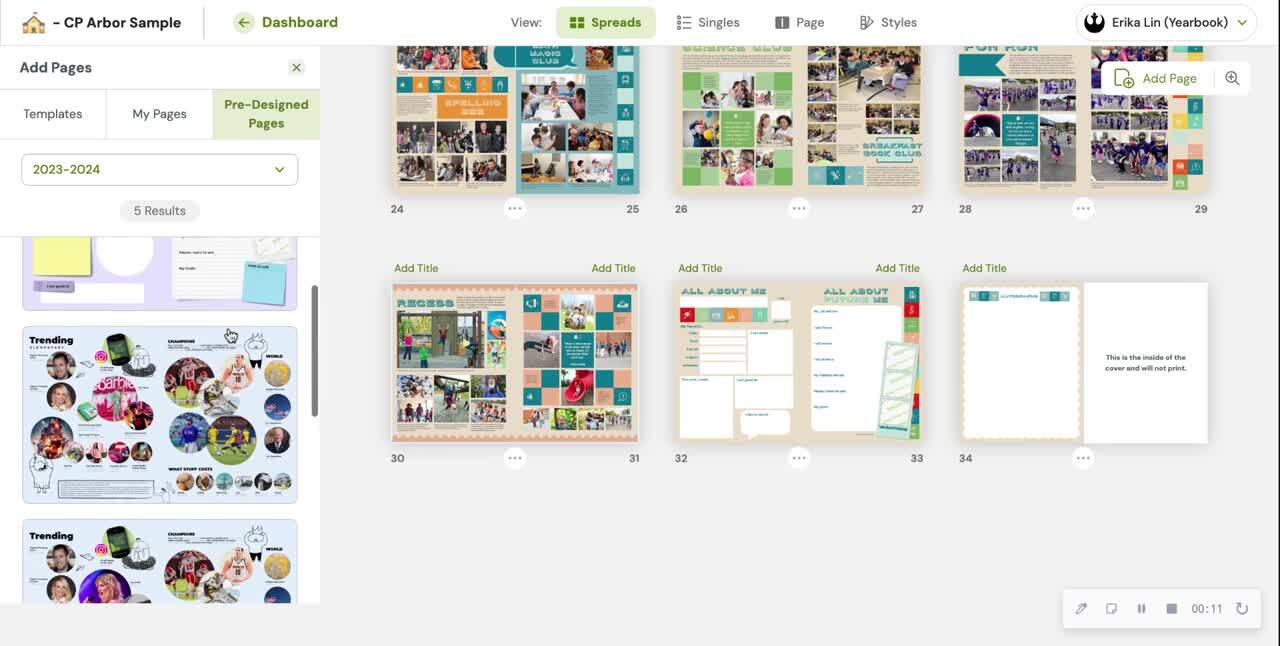
Let It Go... and Celebrate!
Before you hit print ready, ask yourself:
- Do we need to order extra books? (Some schools like to keep a copy in the library.)
- How do we want our books sorted?
- Where should our books be sent?
- When will they arrive and do we need expedited shipping?
Summer
High five! You did it!
QR Code is a registered trademark of DENSO WAVE INCORPORATED.

Summer yearbooking: how to prep
There are two schools of yearbook coordinators: the first, would never click on this blog, and the second, is ready to prep for the following school year. We’re glad you’re ready to lay the foundation for your yearbook over the summer and hope these three steps relieve stress because you’ll enter the school year more prepared than ever, and help you tick off some boxes so you can fully enjoy your summer vacation.
Step 1: Build your Team
Yearbook finished, check! Distribution party a success, check! Use this momentum to recruit a new team. Before you hand out your yearbook staff application, debrief with your current team and state your goals for the upcoming year.
Are you creating a memory book? Be sure to build a team of photographers to capture the emotion behind the events as well as some marketing mavens who will pump up crowdsourcing efforts.
Are you looking to go more journalistic and create a history book? You’ll need writers/reporters in addition to your layout designers and photographers.
Are you creating a spirit book? You’ll want people who are passionate about your school community.
If you lead a student class or club:
- Make sure your recruiting message aligns with your goals
- Highlight the transferable skills
- Solicit recommendations from the faculty as well as your current team
- Build your syllabus and bookmark these rubrics from our free yearbook curriculum
Summer is a great time to do some introductory training with your team. Some advisers do a two- or three-day minicamp and select the theme, colors, and fonts for the year. Others host team-building events to build trust before jumping into design.
If your team is comprised of adults:
- Make sure your recruiting message aligns with your goals
- Set specific expectations for involvement
- Follow up, follow up, follow up
- Offer opportunities for all parents and teachers to contribute

Step 2: Start a Ladder
A ladder is the lifeblood of yearbook organization because it serves two functions:
- It helps you create a schedule
- It helps you determine your page count
From your ladder, you can reverse engineer your yearbook from the final deadline to all the photoshoots that need to be scheduled in between. Since this doc is an overview of the entire book, some yearbook staffs like to post it and use it to check off spreads when they are finished.
Using this yearbook organization module will help you with all the back-end administrivia.
Step 3: Relax and Wait for School to Start
We’re working parents, so we get it: it’s easier said than done. Yes, you’re going to want to solicit summer vacay photos for the yearbook, so grab you-time when you can. From an extra five minutes of privacy in the bathroom to hours with a great book, we wish you well.
To echo the signatures in our yearbooks, have a great summer!

